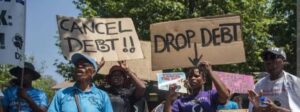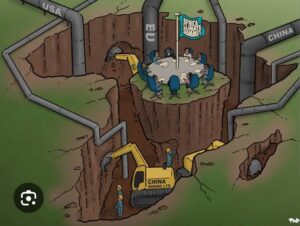Causes
Africa’s Odious Debts
10 Articles
The historical record of Africa’s “debt burden” is critical, since it largely explains why African states have been unable to diversify from their dependence on natural resources, in order to chart independent economic paths. The concept of “odious debt” is an established legal principle, and it is used to refer to debts owed even though the borrowed funds have been misappropriated by state officials and were either used for personal purposes or oppressing the population. Furthermore, the creditors may be considered to have committed a hostile act against the people, if the borrowed funds have been used for purposes that were not in the interests of the people, with the knowledge of the creditors. In such cases, creditors cannot legitimately expect such debts to be repaid.
View DetailsEducation Sovereignty
3 Articles
Parents and families must be empowered to understand that education is an extension of parenting and they must also be encouraged to actively engage in curriculum development, in order to ensure quality education that produces critical thinkers and problem solvers who can realize the true potential of Africa, in addition to their own.
View DetailsFood Sovereignty
7 Articles
Individuals and organizations must work closely together to end hunger and promote food sovereignty, and also establish legal/policy frameworks that facilitate the improvement, growing of and value addition to indigenous food varieties and herbs, while rejecting patented food from foreign sources.
View DetailsHealth Sovereignty
12 Articles
Human dignity, sanctity of life and autonomy in making health care choices must be respected, particularly the right to "free, prior and informed consent" (FPIC). Some medical experts have further proposed that "consent" be replaced with "choice". One of the earliest formal codifications of FPIC was in the Nuremberg Code of 1947 concerning the conditions under which research and experimentation could be carried out on human beings.
View DetailsNatural Resources
15 Articles
Africa is the richest continent in the world. According to the United Nations Environment Program (UNEP), Africa holds about 8 per cent of the world’s natural gas, 12 per cent of the world’s oil reserves, and 30 per cent of the world’s mineral reserves – including the world’s largest reserves of diamonds, cobalt, uranium and platinum. Furthermore, Africa holds 40 per cent of the world’s gold deposits and up to 90 per cent of its platinum and chromium. The continent also holds 10 per cent of internal renewable fresh water sources and 65 per cent of the world’s arable land. It is time that these natural resources benefit Africans, rather than the foreign shareholders of multinational corporations and a few local elites.
View DetailsReassessing the "Climate Crisis'
12 Articles [Cartoon by award-winning Dutch editorial cartoonist, Tjeer Royaards]
Africans need to reassess the continent’s response to the issue of “climate change”, which is a naturally occurring process that is influenced by other significant factors that are beyond human control.
It is also important to note that CO2 occurs naturally in very small amounts (0.04%) in the atmosphere, while human CO2 emissions make up about 33% of this 0.04%. In other words, human CO2 emissions make up 0.0132% of the atmosphere. Furthermore, “Africa has contributed negligibly to the changing climate, with just about two to three percent” of the 0.0132% of the 0.04% above – or the equivalent of about 0.0003% of the atmosphere. In stark contrast, “the richest 1 per cent of the world’s population produced as much carbon pollution in 2019 as the five billion people who made up the poorest two-thirds of humanity…”
Therefore, “innate environmental stewardship” must not be replaced with “climate alarmism”. Furthermore, previous experience should give Africans enough reason to henceforth proceed with great caution and exercise more critical thinking, before adopting any foreign prescriptions to ‘fight’ climate change, particularly those that perpetuate “accumulation by dispossession” on the African continent in the form of “land grabs” for “carbon credits”.
[Cartoon by award-winning Dutch editorial cartoonist, Tjeer Royaards]
Africans need to reassess the continent’s response to the issue of “climate change”, which is a naturally occurring process that is influenced by other significant factors that are beyond human control.
It is also important to note that CO2 occurs naturally in very small amounts (0.04%) in the atmosphere, while human CO2 emissions make up about 33% of this 0.04%. In other words, human CO2 emissions make up 0.0132% of the atmosphere. Furthermore, “Africa has contributed negligibly to the changing climate, with just about two to three percent” of the 0.0132% of the 0.04% above – or the equivalent of about 0.0003% of the atmosphere. In stark contrast, “the richest 1 per cent of the world’s population produced as much carbon pollution in 2019 as the five billion people who made up the poorest two-thirds of humanity…”
Therefore, “innate environmental stewardship” must not be replaced with “climate alarmism”. Furthermore, previous experience should give Africans enough reason to henceforth proceed with great caution and exercise more critical thinking, before adopting any foreign prescriptions to ‘fight’ climate change, particularly those that perpetuate “accumulation by dispossession” on the African continent in the form of “land grabs” for “carbon credits”.

